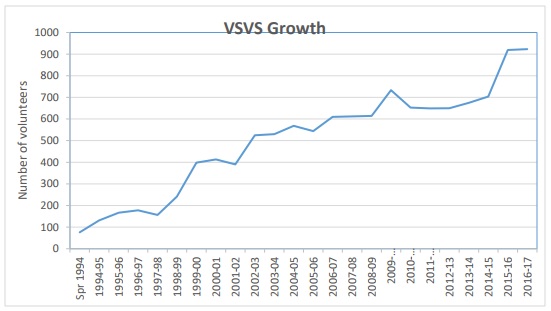In recognition of the extraordinary success of the Vanderbilt Student Volunteers for Science (VSVS), which she coordinates, Pat Tellinghuisen is this year’s recipient of the Vanderbilt Institute of Nanoscale Science and Engineering’s (VINSE) Distinguished Service Award.
The inscription on the award announced last week reads, “For your dedication to the VINSE–VSVS partnership to expand outreach to rural communities”
VSVS was founded in 1994, and Tellinghuisen serves as its program director and faculty adviser. The VINSE Rural Partnership with the VSVS program began in 2012 under the auspices of a National Science Foundation grant designed to bring hands-on science activities to rural middle-school students who live in counties that cannot afford such activities for their students.
VSVS created a series of self-contained kits with all the necessary components for a class of 25 to do hands-on science experiments. In the beginning, graduate students took the kits out to the rural communities, but organizers quickly realized they could reach only a limited number of rural schools in this fashion. So Tellinghuisen—working with Sarah Ross, VINSE program and outreach coordinator—created the Rural Teacher Training Program, which brings grade-school teachers to Vanderbilt twice a year to train them to use the kits, which they then take back to their schools.
“The VINSE–VSVS partnership became a shining star of the National Science Foundation’s TN-SCORE [Tennessee Solar Conversion and Storage using Outreach, Research and Education program],” said VINSE Director Sandra Rosenthal, the Jack and Pamela Egan Professor of Chemistry, when announcing the award Sept. 19.
According to Rosenthal, the program’s staff is currently working with 47 teachers in five counties, and this fall they prepared 263 lessons for 5,680 students in grades 6–8. Since the beginning, the program has partnered with 131 teachers in seven counties, preparing 1,484 kits that have been used by 27,600 students.
“For a little more than 20 years, Pat’s VSVS program has had an enormous impact on the schools in Tennessee and on Vanderbilt undergraduates,” said Rosenthal. “This year marks the 12th consecutive year Vanderbilt Student Volunteers for Science has had more than 600 student volunteers, making it the largest student organization on campus. Pat’s VSVS program has provided more than 100,000 students with hands-on science. It’s thrilling to imagine how many chemists, physicists, geologists, engineers and, perhaps most important, new science teachers were first inspired by doing one of Pat’s kits.”
